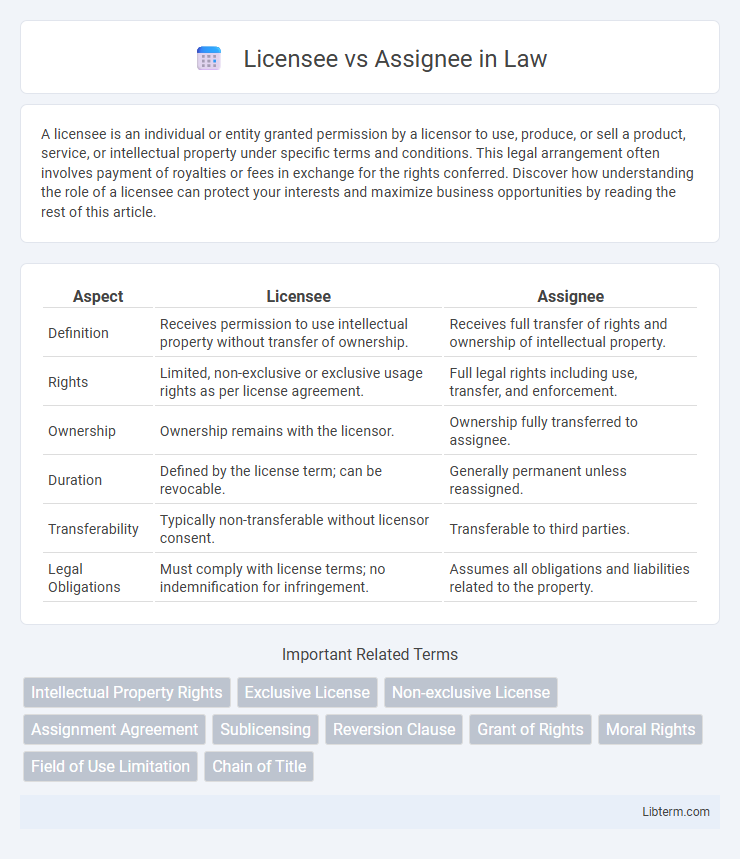A licensee is an individual or entity granted permission by a licensor to use, produce, or sell a product, service, or intellectual property under specific terms and conditions. This legal arrangement often involves payment of royalties or fees in exchange for the rights conferred. Discover how understanding the role of a licensee can protect your interests and maximize business opportunities by reading the rest of this article.
Table of Comparison
| Aspect | Licensee | Assignee |
|---|---|---|
| Definition | Receives permission to use intellectual property without transfer of ownership. | Receives full transfer of rights and ownership of intellectual property. |
| Rights | Limited, non-exclusive or exclusive usage rights as per license agreement. | Full legal rights including use, transfer, and enforcement. |
| Ownership | Ownership remains with the licensor. | Ownership fully transferred to assignee. |
| Duration | Defined by the license term; can be revocable. | Generally permanent unless reassigned. |
| Transferability | Typically non-transferable without licensor consent. | Transferable to third parties. |
| Legal Obligations | Must comply with license terms; no indemnification for infringement. | Assumes all obligations and liabilities related to the property. |
Understanding Licensee vs Assignee: Key Definitions
A licensee is granted permission to use property or intellectual property without transferring ownership, typically through a licensing agreement that specifies usage rights and limitations. An assignee receives full transfer of rights or interest from the original owner or holder, often related to contracts, intellectual property, or property titles, gaining the ability to enforce or manage those rights. Distinguishing between a licensee and an assignee is essential for understanding legal rights, obligations, and the extent of control over the asset or property involved.
Legal Foundations: Licensing and Assignment Explained
Licensees acquire specific rights to use intellectual property under defined conditions without ownership transfer, governed by licensing agreements that clarify scope and duration. Assignees receive full ownership rights and responsibilities through assignment contracts, enabling complete control and legal authority over the asset. Legal foundations distinguish licensing as a permission-based arrangement, while assignment constitutes a transfer of title, with implications for enforcement, liability, and exclusivity.
Core Differences Between Licensee and Assignee
A licensee obtains permission to use intellectual property without transferring ownership rights, while an assignee receives full ownership and control over the property rights. Licensees have limited, revocable rights tied to specific terms, whereas assignees hold permanent, transferable rights subject to assignment agreements. The distinction impacts legal obligations, enforcement rights, and the scope of use permitted under intellectual property law.
Rights and Obligations of a Licensee
A licensee obtains permission to use intellectual property or a product without ownership transfer, limiting their rights to the scope defined in the license agreement. Their obligations include complying with usage restrictions, maintaining confidentiality, and avoiding unauthorized exploitation beyond the licensed terms. Unlike assignees who receive full ownership rights, licensees hold a temporary, non-transferable interest subject to termination upon breach of contract.
Rights and Obligations of an Assignee
An assignee acquires the rights and obligations of a contract or property interest transferred from the assignor, often gaining full enforcement power against the obligor. Rights of an assignee typically include the ability to collect payments, enforce contract terms, and benefit from any related rights originally held by the assignor. Obligations of an assignee may involve adhering to existing contract conditions, assuming liabilities associated with the assigned rights, and ensuring proper notification to relevant parties.
Common Scenarios for Licensing vs Assignment
In common licensing scenarios, a licensee obtains permission to use intellectual property while the owner retains full ownership and control, typically seen in software, trademarks, or patented technology usage agreements. Assignments involve the transfer of ownership rights from the assignor to the assignee, often occurring in patent or copyright transfers where the assignee gains full control and rights to the intellectual property. Licensing is preferred for temporary or specific usage rights, whereas assignments are common in sales, mergers, or estate planning where permanent ownership changes are required.
Implications for Intellectual Property Ownership
A licensee obtains permission to use intellectual property (IP) without acquiring ownership rights, meaning the original owner retains control and can impose restrictions. An assignee transfers ownership of the IP rights entirely, granting full control and the ability to enforce those rights independently. This distinction significantly impacts the scope of legal rights, enforcement capabilities, and potential for sublicensing or further transfer.
Contractual Considerations: Drafting Licenses and Assignments
Drafting licenses requires clear terms on scope, duration, and permitted uses to protect the licensor's rights while granting specific usage to the licensee without transferring ownership. Assignments involve the complete transfer of contractual rights and obligations from the assignor to the assignee, necessitating explicit consent clauses and warranty provisions to avoid disputes. Careful distinction in contract language ensures enforceability and clarity in rights, responsibilities, and potential liabilities for both licensees and assignees.
Potential Risks and Disputes: Mitigation Strategies
Licensees face potential risks such as limited rights and revocation, while assignees may encounter disputes over contract enforceability and scope of transferred rights. Clear contractual language, thorough due diligence, and legal counsel involvement are essential to mitigate risks and prevent disputes. Employing detailed assignment clauses and maintaining open communication between parties further reduces misunderstandings and liability exposure.
Choosing Between Licensing and Assignment: Best Practices
Choosing between licensing and assignment depends on the degree of control and duration desired over intellectual property rights. Licensing grants permission to use the IP while retaining ownership, ideal for ongoing revenue streams and limited control transfer. Assignment involves transferring full ownership and rights, suitable for one-time sales or when relinquishing all future claims to the IP asset.
Licensee Infographic

 libterm.com
libterm.com